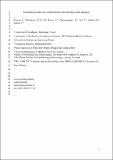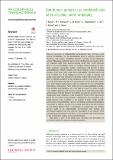Files in this item
Non-human primates use combined rules when deciding under ambiguity
Item metadata
| dc.contributor.author | Romain, A. | |
| dc.contributor.author | Broihanne, M.-H. | |
| dc.contributor.author | De Marco, A. | |
| dc.contributor.author | Ngoubangoye, B. | |
| dc.contributor.author | Call, Josep | |
| dc.contributor.author | Rebout, N. | |
| dc.contributor.author | Dufour, V. | |
| dc.date.accessioned | 2020-09-25T15:30:01Z | |
| dc.date.available | 2020-09-25T15:30:01Z | |
| dc.date.issued | 2021-03-01 | |
| dc.identifier | 270346198 | |
| dc.identifier | d23bcbd8-41e3-4a22-8804-0e9c5c35b5ca | |
| dc.identifier | 85099580478 | |
| dc.identifier | 000609446300006 | |
| dc.identifier.citation | Romain , A , Broihanne , M-H , De Marco , A , Ngoubangoye , B , Call , J , Rebout , N & Dufour , V 2021 , ' Non-human primates use combined rules when deciding under ambiguity ' , Philosophical Transactions of the Royal Society. B, Biological Sciences , vol. 376 , no. 1819 . https://doi.org/10.1098/rstb.2019.0672 | en |
| dc.identifier.issn | 0962-8436 | |
| dc.identifier.other | ORCID: /0000-0002-8597-8336/work/88267792 | |
| dc.identifier.uri | https://hdl.handle.net/10023/20688 | |
| dc.description | Funding: This work was supported by grants from the Agence Nationale de la Recherche (ANR-08-412 BLAN-0042-01), and the European Science Foundation (Compcog Exchange Grant n°3648). | en |
| dc.description.abstract | Decision outcomes in unpredictable environments may not have exact known probabilities. Yet the predictability level of outcomes matters in decisions, and animals, including humans, generally avoid ambiguous options. Managing ambiguity may be more challenging and requires stronger cognitive skills than decision-making under risk, where decisions involve known probabilities. Here we compare decision-making in capuchins, macaques, orangutans, gorillas, chimpanzees and bonobos in risky and ambiguous contexts. Subjects were shown lotteries (a tray of potential rewards, some large, some small) and could gamble a medium-sized food item to obtain one of the displayed rewards. The odds of winning and losing varied and were accessible in the risky context (all rewards were visible) or partially available in the ambiguous context (some rewards were covered). In the latter case, the level of information varied from fully ambiguous (individuals could not guess what was under the covers) to predictable (individuals could guess). None of the species avoided gambling in ambiguous lotteries and gambling rates were high if at least 2 large rewards were visible. Capuchins and bonobos ignored the covered items and gorillas and macaques took the presence of potential rewards into account, but only chimpanzees and orangutans could consistently build correct expectations about the size of the covered rewards. Chimpanzees and orangutans combined decision rules according to the number of large visible rewards and the level of predictability, a process resembling conditional probabilities assessment in humans. Despite a low sample size, this is the first evidence in non-human primates that a combination of several rules can underlie choices made in an unpredictable environment. Our finding that non-human primates can deal with the uncertainty of an outcome when exchanging one food item for another is a key element to the understanding of the evolutionary origins of economic behavior. | |
| dc.format.extent | 2179766 | |
| dc.format.extent | 3136700 | |
| dc.language.iso | eng | |
| dc.relation.ispartof | Philosophical Transactions of the Royal Society. B, Biological Sciences | en |
| dc.subject | Gambling risk | en |
| dc.subject | Conditional probability | en |
| dc.subject | Decision-making | en |
| dc.subject | Monkeys | en |
| dc.subject | Apes | en |
| dc.subject | QH301 Biology | en |
| dc.subject | RC0321 Neuroscience. Biological psychiatry. Neuropsychiatry | en |
| dc.subject | DAS | en |
| dc.subject.lcc | QH301 | en |
| dc.subject.lcc | RC0321 | en |
| dc.title | Non-human primates use combined rules when deciding under ambiguity | en |
| dc.type | Journal article | en |
| dc.contributor.institution | University of St Andrews. Centre for Social Learning & Cognitive Evolution | en |
| dc.contributor.institution | University of St Andrews. School of Psychology and Neuroscience | en |
| dc.identifier.doi | https://doi.org/10.1098/rstb.2019.0672 | |
| dc.description.status | Peer reviewed | en |
This item appears in the following Collection(s)
Items in the St Andrews Research Repository are protected by copyright, with all rights reserved, unless otherwise indicated.


